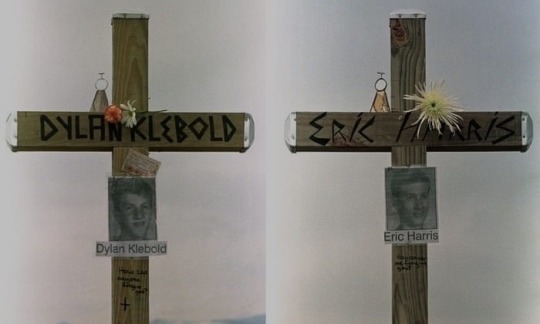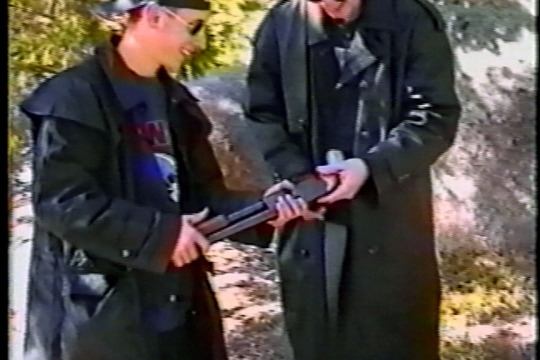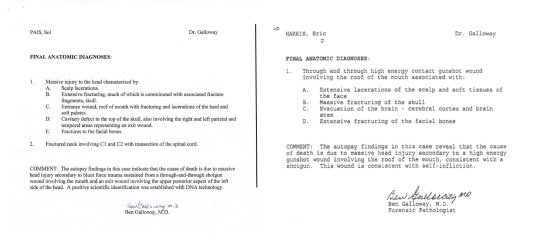#eric harris
Text

25 Years.
#tcc#true crime community#true crime#tccblr#columbine 1999#tcc columbine#tcc community#eric harris#eric and dylan#dylan klebold
194 notes
·
View notes
Text
The theory that Eric cared for Dylan more than Dylan cared for Eric is...wrong.
I have heard, every now and again, a theory that Dylan was Eric's best friend but Eric was not Dylan's best friend. Sue Klebold mentions this in her book by bringing up Dylan's closeness to friends like Nate Dykeman or Zack Heckler, but here's my take:
I think Dylan really wanted to be accepted; Eric wanted to be accepted too. Dylan's desperation for friendship allowed him to accept Eric and vice versa.
Truly, I don't think anybody saw the depth of their relationship because they didn't want anyone to. This is the same concept we can apply to the entire, what, year? That they spent plotting their attack.

When Eric and Dylan were arrested in January 1998, it was like the nail in their coffins. Eric would go on to write in his journal: "Isn’t America supposed to be the land of the free? How come, If I’m free, I can’t deprive a stupid fucking dumbshit from his possessions if he leaves them sitting in the front seat of his fucking van out in plain sight and in the middle of fucking nowhere on a Frifuckingday night. NATURAL SELECTION. Fucker should be shot."
Dylan fashioned his messages to Eric in the style of Doom books, going so far as to write multiple notes to him throughout the entire yearbook and drawing a Doom POV shotgun as an indicator to “continue [reading] where you see this.”
Upon the numerous pages he wrote, he drew pictures of fictional characters that Eric liked and quoted Eric’s own website posts back to him (Specifically writing: You know what I hate??? PEOPLE!! YEAA!!). He recounts his favorite memories over the last year: working together at Blackjack, smoking cigarettes together at Blackjack, lighting fires, and the last two 4th of July celebrations.
In the end of March 1998, Eric wrote in his planner that he still had movie plans with Dylan. This was at the same time that Dylan told Brooks about Eric’s website and threats.
In April 1998, Eric writes, "…sometime in April [1999] me and V will get revenge and kick natural selection up a few notches." This indicates their continued contact and their early planning of their attack on Columbine.
Dylan would write in Eric’s 1997-1998 yearbook: "We, the gods, will have so much fun w NBK!! Killing enemies, blowing up stuff, killing cops!! My wrath for January’s incident will be godlike."
As early as April 1998 Eric mentions “going NBK.”
Dylan was deeply connected to Zack especially, and took it really hard when Zack and Devon started dating. However, Dylan also laments over the fear of losing Eric too once Eric started casually seeing someone. He had the same fears of abandonment that he did for Zack as he did for Eric...but perhaps, to a lesser degree.
Eric and Dylan had achieved homophily. While both of them maintained their own separate peer groups, their relationship remained constant. The amount of time they spent together continued to mount, despite their closeness having a tendency to go unnoticed or be dismissed. In Sue’s book, the claim is made that Nate was Dylan’s closest friend. With this in mind, who did Dylan choose to sign up for every single class with? Who did he sit with in every class? Who did he wake up at 3:30AM with to get the best parking spots at school? Who did he routinely sneak out with every week? And lastly, who did he choose to die with?
575 notes
·
View notes
Text
Eric Harris' journals were meant to be looked at and seen as horrible and disgusting, Eric wanted to be seen as some God who felt no pity, no sadness, no remorse, no emotion. He wanted to feel like a badass like doomguy for example. Eric is a product of his time and the media he consumed, he never once was really honest in his journals because as I said, they were meant to be found. He didn't show how he truly felt or thought in his journals or online entries, these were all a persona he put up. So the argument that Eric was a monster or did it cause he could has no evidence, Eric had emotions and feelings too, did he show them in his writings? No. They're the writings of a edgy teenager with issues that we cannot and likely will never know, especially since his families full disownment of their son, not accepting his ashes and never mentioning him afterwards as much, showing photos, nothing. Whatever Eric felt truly died with him.
"Feels like a character" cause he was. His persona online and in the footage we see is all one. welcome to my 5 minute typed out rant

#tcc tumblr#nikita lytkin#tcc columbine#dylan columbine#eric and dylan#columbine high massacre#eric columbine#columbine massacre#columbine school shooting#columbine 1999#eric harris#j3suschristpornostar
168 notes
·
View notes
Text

sol and eric's autopsies were both done by the same person, which i thought was interesting.
517 notes
·
View notes
Text

reappearing to post this because i audibly gasped, i’ve never seen this photo of him before 🫣
269 notes
·
View notes
Text
Eric Harris: Online

We explore Eric's affinity for escapism and his behavior online. Super long post, tl;dr at end.
As a teenager, Eric grew more withdrawn. His interests began to take shape around computers and he was particularly fond of Doom II, a 90’s first-person shooter in which the main character (Doomguy) fights hoards of demons on Earth. Doom II included multiplayer, as did its predecessor, Doom. However, one large development that Eric especially enjoyed was the ability to create custom levels for Doom II.
To this day, Eric’s Doom files (.wad) still roam the internet, somehow miraculously not lost to the sands of time. He seemed to particularly enjoy creating deathmatch levels and would encourage users reading the .readme files for his levels to email him and play with him.
Creating these levels for Doom was a passion project for Eric. He would work carefully on his wads, even going as far to create his own monster death animations. While it’s very easy to create and distribute modifications for most games today, this was an impressive feat in the mid-late 1990s. Computers and access to the internet was still hitting the homefront, albeit in a massive boom. As technology flourished in the home, Eric found a means to channel his creativity.
In the infamous “U.A.C. Labs” level, Eric created two fast-paced levels that incorporate jump-scares, plot-twists, and lots of action. He nearly overloaded one of the areas with a spawn of 150+ some monsters that is triggered by the player coming too close to a key that’s required to access the next area. Eric was very proud of this particular level, writing in the .readme: …This one took a damn long time to do, so send me some bloody credit man!...Authors may NOT use this level as a base to build additional levels. You may NOT change a damn thing with this WAD, if you do, I will blow you up. And it will be cool.
See below: blueprints drawn by Eric in his journal detailing one of his wads. These can be found throughout his writings.

Clearly, Eric was interested in protecting the level’s artistic integrity. This was work he took a great deal of pride in. Eric was described as being interested in pursuing a career in digital development by Brooks, who thought it was feasible he may end up as a videogame designer.
What was it about Doom that Eric enjoyed so much?
For starters, the game was paramount in its offering of gore, metal music, and gameplay. Doom was nonstop action with intriguing stories that could be followed along in both game and book. It is my theory that Eric enjoyed high-paced, high-action activities to stimulate a mind he was not entirely comfortable being alone with. This was also a world in which Eric could control – he could smite down the monsters in his path and he knew what lay around every corner. This may be considered a form of escapism, which is not necessarily new behavior in teenagers. Interestingly, however, there are multiple studies that have been conducted specifically observing the video game escapism phenomenon.
During periods of heightened psychological distress and escapism, the individual increases the amount of online activity, video game play-time, and gambling frequency (Jouhki, Savolainen, Sirola, & Oksanen, 2022). These three behaviors are specifically intriguing as they all provide forms of distraction.
Have you ever been to a casino? There are no windows, therefore, there is no sense of the passage of time. You are inundated by flashing lights, loud sounds, bright colors, and excitement. I once found myself with a drink in hand, sitting at a digital slot machine with interesting animations and upbeat music. It was a penny slot, but I won $20 on my first try. Next thing I knew, my friend and I had spent 5 fast hours playing slots, digital blackjack, and having the time of our lives. I ended up only losing $10 in the end.
Casinos are intended to be a distracting environment that draws in the consumer and traps them for hours of endless stimulation. This is the same idea applied to video games, which are intended to provide hours of entertainment, something humans are constantly in search of. For example, small rodents do not require a television. While providing pet rodents with enrichment is undoubtedly very healthy for them, their enrichment simulates foraging, which is their biological purpose. Humans, now more than ever, rely on entertainment from every angle. It is especially difficult for those going through a psychological hardship to not stimulate their minds. Rather, it can be easier to avoid and escape the difficult and, often, intrusive thoughts. Psychological distress and a method to avoid dealing with such troubles creates the perfect storm within an emotionally unintelligent and unequipped teenage boy.
Eric spending hours building a new level in Doom was simply a way to ease the passage of time. Controlling and manipulating the environment may have provided a sense of control that was not otherwise found in everyday life. In addition to this, Eric understood Doom better than he was capable of understanding his emotions.
To Eric, Doom symbolized something he was not: powerful, strong, and capable. In the basement tapes, Eric and Dylan explain their murderous motivations. Eric references his favorite game: “It’s gonna be like fucking Doom man; after the bombs explode.”
I often argue against the claim that video games were to blame for Eric’s violent behavior and plans despite this evidence. Longitudinal studies have proven that video games do not influence violent crime or behavior. After a 2-year study on Singapore youth, it was concluded that 27 hours of gameplay per day would be required to see any clinical effects or behavioral changes due to violent video games (Ferguson and Wang, 2019). In Eric’s own words, he was fighting himself to separate from his moral compass in order to follow through with the plan he and Dylan had been concocting. In order to do this, he began to think of their plan like it was another Doom level he was crafting. Video games may not be the direct cause of Eric’s violence, but I do believe he used them to justify his violence (to himself).
It was also during this time that the social internet was booming. WebChat Broadcasting System (WBS) and American Online (AOL) began the excitement of site hosting and chatrooms. Personal profiles encouraged a space for teenagers like Eric to freely share their thoughts and interests and connect with others on a scale that had not yet been seen before. Eric took an extremely strong liking to the new social sphere he’d discovered and created multiple AOL profiles and webpages.
Eric even created a webpage to host a series of “Jo Mamma” anti-jokes, crediting himself, Dylan, and Zack Heckler under their respective screen names Reb, VoDkA, and KiBBZ. One of the jokes on their site read: Jo mamma so fat she doesnt even look at the nutrition value tables on the food boxes she eats.....she just buys them and eats them.....cause shes fat...JJJEEYAAAAAA!!!!
Much like people today sharing private thoughts on Facebook or Twitter, Eric was sharing his private thoughts on his own websites. Ranging from “jo mamma” jokes to death threats, Eric didn’t hesitate over-sharing every thought he had on his personal blog.
Online oversharing is an extremely new and modern communicative phenomenon. The scale at which humans are now able to communicate is unprecedented and, frankly, not something humans were ever equipped to be able to do. Eric’s internet presence feels like a primitive version of how a teenager today would dump their opinions and ideas onto Twitter.
On these blogs, Eric would share self-described “missions” in which he and Dylan would test homemade pipe bombs. He described lists of things he hated, desires to kill others, and people he hated. As we have already discussed, Eric would also make mention of Brooks Brown.
Eric would also describe fantasizing breaking into Brooks’s home and urinating on him and his family members and would also, unprompted, share Brooks’s phone number in a “mission” post. Eric would share Brooks’s number online on multiple occasions:
…This mission was also liquor free as a result of this person named Brooks Brown (phone number) who tried to narc on us.
A reason he might have shared such tenacious things online was to seek the thrill of seeing what he could publicly get away with or attention from outsiders. Eric might have enjoyed attention from any angle, be it support for his ideals or shock. This attention, no matter where it came from, would still feed his ego. Eric wanted people to see and he didn’t care what they thought.
Studies have shown that individuals who post their own photos or private messages to personal blogs are attempting to construct their desired public identity (Jung, Song, & Vorderer, 2012). As Eric shared more and more deeply personal thoughts, he was further crafting the public Doom-esque image of himself he wanted others to see.
Eric also displayed a troubling tendency to overshare online. Have you ever scrolled on your social media timelines and found a post that was just unsettlingly personal and wondered, Why on Earth would anyone want to share that publicly?
The tendency to overshare just stems from an overall need for attention. Social media provides a very easy way to continuously farm serotonin. Consistently sharing ideas and thoughts into a space where others can very easily validate them can almost serve as catharsis for a large amount of people. However, oversharing on social media has actually been discovered to have a direct association with anxiety issues, problematic social media use, and attention-seeking behaviors (Shabahang, Shim, Aruguete, & Zsila, 2022).
I theorize that Eric was mainly searching for attention with each new entry he put forth onto the internet. This was a teenager who had been deprived of the right kinds of attention and would seek to push boundaries in order to get it. His posts were also indicative of his declining mental state. As his posts became darker and darker, it became clear that this was not only Eric’s outlet for gaining attention, but in some areas had evolved into his personal massacre planner.
Read one of Eric's most troubling online posts here (pages 39 and 40)
What would prompt someone to write such horrible things? Why did Eric feel this way? Why did he claim to hate the world? What about his life left him and Dylan feeling like they “had no other choice?” I theorize that Eric projected his loneliness and lack of meaningful relationships onto the rest of the world. After all, how could any of this be his fault? In his mind, something must have been terribly wrong with him to be rejected by everyone.
Why was he so angry? Truly, we can see that Eric’s anger was displaced. I theorize that Eric blamed the world that felt like it had betrayed him so many times for his shortcomings. His self-esteem was incredibly low and he was poor at maintaining friendships. From time to time, he was targeted by bullies and felt like an outsider. Rejected children often react aggressively and underestimate how disliked they are by their peers.
Numerous witness statements describe a distaste or distrust of Eric. One incident after another, people found Eric unapproachable. He kept mutual friends with Dylan, but it’s most likely he was more Dylan’s friend in the circle than he was anyone else’s.
TL;DR:
Playing Doom and creating .wads for the game was a form of escapism for Eric; he could create a world he was in control of
Escapism damages an individual's ability to solve emotional problems; it's not a relief, it's merely "putting off" the problem the individual must solve without teaching any healthy coping mechanisms
Eric was crafting an image of himself that he wanted others to perceive; someone who was strong, badass, in control, and took no names...all of which he did not truly think he was. Eric knew he was just an average teenage boy and he hated it
Eric needed attention from anyone he could find, whether or not those accolades be positive or negative. He was pushing his boundaries to see what he could get away with; to see what he could feel
I've been taking all of what I'm posting from a case study I wrote a while back. I keep forgetting to cite my sources since it's...you know...tumblr.
References:
Ferguson, C. J. & Wang, C. K. J. (2019). Aggressive video games are not a risk factor for future aggression in youth:
A longitudinal stud. Journal of Youth and Adolescence, 48. https://link.springer.com/article/10.1007/s10964-019-01069-0
Jouhki, H., Savolainen, I., Sirola, A., & Oksanen, A. (2022). Escapism and Excessive Online Behaviors: A Three-Wave Longitudinal Study in Finland during the COVID-19 Pandemic. Int J Environ Res Public Health, 19(19). doi: 10.3390/ijerph191912491.
Jung, Y., Song, H., & Vorderer, P. (2012). Why do people post and read personal messages in public? The motivation of using persona blogs and its effects on user's loneliness, belonging, and well-being. Computers in Human Behavior, 28(5). pp 1626-1633. https://doi.org/10.1016/j.chb.2012.04.001
Shabahang, R., Shim, H., Aruguete, M. A., & Zsila, A. (2022). Oversharing on Social Media: Anxiety, Attention-Seeking, and Social Media Addiction Predict the Breadth and Depth of Sharing. Psychological Reports.
https://doi.org/10.1177/00332941221122861
#eric harris#dylan klebold#columbine#true crime#tcc#true crime community#psychology#i have a degree :-|
431 notes
·
View notes
Text
All Eric & Dylan scenes in 2016 movie, “I’m Not Ashamed”
#Eric Harris#Dylan Klebold#Brooks Brown#Rachel Scott#Craig Scott#movie#I’m Not Ashamed#Eric and Dylan#scenes#nbk#trench coat mafia#Columbine#high school#shooting#nikkinikums
430 notes
·
View notes
Text
25
i think of school shooters the same way that id think of a spoiled child being told "no" to having their third serving of ice cream for the day it's like they figure out that life isn't fair (which literally everyone else figured out at birth + mental illnesses) in spite of their many privileges and then they fucking lose it
and as much as i think back to eric harris and how i feel bad for him on occasion, for him and dylan to grasp at straws for reasons to hate others (which is not to undermine the bullying and torment they received) is insane to me (like him getting pissed about girls not calling him back or dylan slapping his coworker because she told him off about something).
all of this and their childishness in spite of the fact that they were literally planning a massive terrorist attack (which isn't so childish) is essentially prominent in how they mention that the shooting is their fault entirely. did they just think that bbecause you say something that it automatically becomes true? i mean, e&d were going to kill themselves and it ain't possible to bring a dead person to court, so of course they'd arrest mark manes and philip duran and bring robyn to court
i just don't think eric and dylan really understood the consequences of their actions because they were so caught up in this retarded escapist fantasy where they were the heroes in tarantino films (and teenagers). i think the concept of this just makes me sad in general, since the way they behaved during and leading up to the shooting was an obvious way for them to feel powerful and in control, which had been stripped from them by that very school.
i also don't mean to undermine the horrid environment at columbine and the obvious favoritism that plagued the student body and staff. harris and klebold were incredibly mentally ill, which when is combined with a toxic environment in which you spend your developmental years and a mutually hate-filled friendship, results in tragedy.
it also hurts my heart to read anecdotes about the victims, eric and dylan included, from those who loved them. hearing about how cassie bernall struggled with suicidality, thoughts of killing her parents, and briefly experimenting with the goth subculture made me wonder if eric or dylan ever considered that others felt the same pain and troubles that they did. hearing about how devon adams had to decide on which friend's funeral to attend, one murdering the other and many more, reading about an interaction brooks had with rachel while they were smoking wherein they discussed their religious affiliations respectfully, learning about how daniel mauser would attend anti-gun protests, devon sharing how dylan saved one of rachels interpretive dances by fixing the tape, etc make me think of how intertwined littleton is (especially columbine kids) and the domino effect that it's had on the world.
so many shooters have cited e&d as inspirations, people have replicated wrath and natural selection shirts, written fics about them, plays, films, etcetera. there's online communities dedicated to colimbine, sometimes as part of a larger true crime community, where people discuss and learn about it. i myself began research approx. 2 years ago and have since developed a special interest regarding columbine. deaths, other than ones because of copycat shooters/killers such as sol pais are linked to columbine. it's had such an imnense effect on the world that cannot be understated solely because of its magnitude.
columbine was so senseless and i hate that 14 children and a beloved teacher died so that e&d could "even the score." i hope, in their final moments, that eric and dylan felt ashamed and embarrassed of what they did, the world, music, movies, their hobbies and interests they discarded, the people they left behind who've been left to pcik up the pieces of their destruction
65 notes
·
View notes